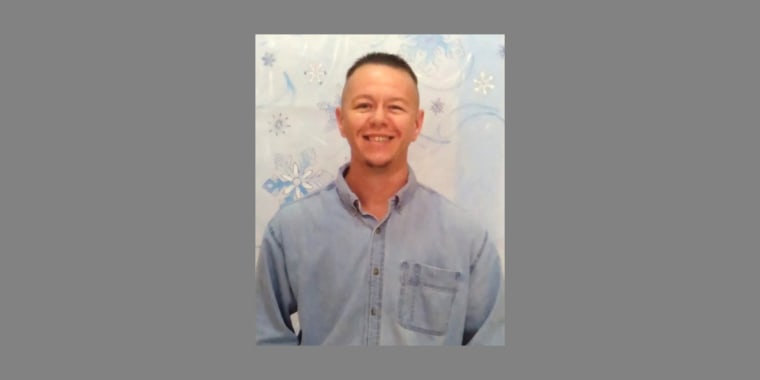An incarcerated transgender man filed a complaint Wednesday against the Virginia Department of Corrections, or VADOC, for denying him surgery and other treatment for gender dysphoria, according to court documents shared with NBC News.
The lawsuit, brought by Lambda Legal, a legal organization that focuses on LGBTQ rights, is among the first filed by an incarcerated transgender man for denial of treatment for gender dysphoria. A number of lawsuits have been filed — and some won — by trans women inmates in recent years.
The plaintiff, Jason Yoakam, was convicted of first-degree murder in 2004 and has since been incarcerated at the Fluvanna Correctional Center for Women in Troy, Virginia. In 2017, VADOC medical providers diagnosed Yoakam with gender dysphoria, which refers to the psychological distress that results from an incongruence between one’s sex assigned at birth and one’s gender identity, according to the American Psychiatric Association.
Despite that diagnosis, medical providers have refused to provide Yoakam with treatment, including mental health services from qualified providers and a bilateral double mastectomy, or surgical removal of the breasts, according to the complaint, which was filed in the U.S. District Court for the Western District of Virginia. Yoakam’s doctors and a transgender health care specialist requested the treatment, the complaint states.
“The only thing I am asking is to be treated fairly and have access to the same standard of healthcare that other incarcerated people receive,” Yoakam said in a statement. “It has been traumatizing, isolating, and stigmatizing to be denied health care services to treat the gender dysphoria that VDOC’s own providers have diagnosed.”
Lambda Legal argues that denying Yoakam surgery and other treatment for gender dysphoria violates the Eighth Amendment’s prohibition on cruel and unusual punishment and the equal protection clause of the 14th Amendment.
Yoakam is also making statutory claims under the Americans With Disabilities Act, due to his gender dysphoria diagnosis; Section 504 of the Rehabilitation Act, which forbids organizations and employers from denying benefits and services to people with disabilities; and Section 1557 of the Affordable Care Act, which prohibits discrimination in federally funded health care facilities.
The complaint lists 10 defendants, including Harold Clarke, director of the Corrections Department; Mariea LeFevers, warden of the Fluvanna Correctional Center for Women; and other mental health providers for the department.
The defendants didn’t immediately respond to NBC News’ request for comment.
Yoakam’s complaint says that from an early age, he “saw himself as a boy and could not understand why people would see him as a girl.” He also lived as a man and was out to his family, friends and co-workers before his incarceration.
In 2017, after he was diagnosed with gender dysphoria by VADOC medical providers, staff at the Fluvanna Correctional Center for Women provided him with a chest binder so he could compress his chest as treatment for his gender dysphoria, and he began hormone therapy, according to the complaint.
“Since he was issued a binder in FCCW, Mr. Yoakam keeps his binder on throughout all hours of the day, except when he must shower,” the complaint states. “He sleeps in his binder. As noted in his medical records, the binder sometimes is so tight that it cuts into Mr. Yoakam’s skin and causes him to bleed. He has also developed scars, rashes, and acne from the binder. These injuries have also led to infections from the binder. Unless he receives chest surgery, Mr. Yoakam will have to continue to use the binder and suffer the resulting injuries.”
The complaint also adds that Yoakam’s dysphoria has worsened over the years, especially in relation to his chest. He becomes physically sick to his stomach when he showers, and he has depression, anxiety and panic attacks, among other health issues, the complaint states.
Starting in January 2018, multiple doctors who work outside of VADOC requested a bilateral mastectomy for Yoakam as treatment for his dysphoria or provided referrals for such treatment. But in every instance, the request was denied by officials at VADOC and was deemed not medically necessary.
Lambda Legal argues VADOC is violating Yoakam’s constitutional rights.
“This is about health care,” Richard Saenz, a senior attorney at Lambda Legal who is representing Yoakam, said. “Mr. Yoakam and other incarcerated people have a right to health care under the Constitution, and here the Virginia Department of Corrections is not providing him with the medical care that his doctors have deemed medically necessary for him.”
Saenz noted that surgical intervention is among the many potential treatments for gender dysphoria that is recommended by the standards of care provided by the World Professional Association for Transgender Health, the nonprofit organization devoted to treating and understanding gender dysphoria that is considered the governing body on the issue. Yoakam’s doctors, in accordance with those standards, recommended surgery.
Major medical groups such as the American Medical Association, American Psychological Association, American Psychiatric Association and Endocrine Society also recognize gender dysphoria as a serious condition that requires treatment, the complaint notes.
“Defendants knew that denying Mr. Yoakam chest surgery placed him at a substantial risk of serious harm including depression, anxiety, mental impairment, physical self-harm, and suicide, and future harm as his condition worsened,” the complaint states.
In similar cases, some incarcerated trans women have prevailed at securing medical treatment. In 2020, Adree Edmo won a yearslong battle against the state of Idaho and the Idaho Department of Correction's health care provider, Corizon Health Inc., for gender-confirmation surgery.
In 2018, a federal court struck down a “freeze frame” policy in Missouri, which banned hormone treatment for any transgender person who was not receiving such treatment prior to incarceration.
But courts are split on the issue. In 2020, the 11th U.S. Circuit Court of Appeals overturned a ruling against a Florida policy that prevented Reiyn Keohane, an incarcerated trans woman, from accessing hormone therapy. The American Civil Liberties Union, which is representing Keohane, appealed the decision to the Supreme Court.

